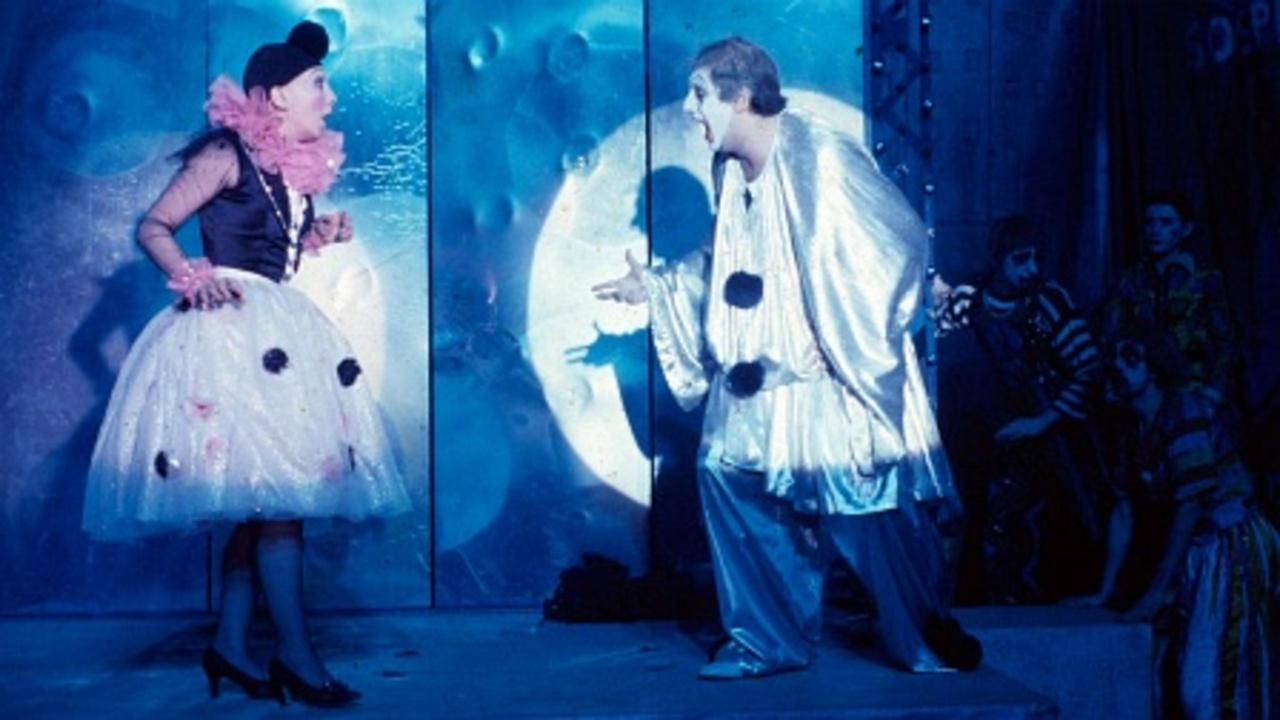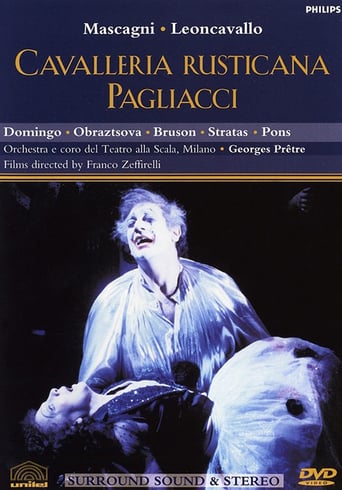

Intense, gripping, stylish and poignant
... View MoreIt's the kind of movie you'll want to see a second time with someone who hasn't seen it yet, to remember what it was like to watch it for the first time.
... View MoreJust intense enough to provide a much-needed diversion, just lightweight enough to make you forget about it soon after it’s over. It’s not exactly “good,” per se, but it does what it sets out to do in terms of putting us on edge, which makes it … successful?
... View MoreThere are moments that feel comical, some horrific, and some downright inspiring but the tonal shifts hardly matter as the end results come to a film that's perfect for this time.
... View MoreI think Franco Zeffirelli is a very talented director. Of all his opera films, I love every single one. All of them, especially La Traviata, are visually beautiful, with wonderful music and superb acting and singing. Pagliacci is no exception. I love two film versions of this great opera to death, this and the 1968 TV version with Jon Vickers as Canio and Herbert Von Karajan, the latter I am more familiar with but there is so much to love about Zeffirelli's film.About Pagliacci itself, it has a quite simple(in its structure) story but its events are very dramatic, especially in Act 2 when Canio comes on stage in his Pagliaccio guise and tells Nedda to reveal her lover and she tries to make it part of the show. It is a great story essentially with themes of love, betrayal and jealousy, with characters that you do care for regardless of their actions. Leoncavallo's music is superb, not just Vesti La Guibba which is heart-rending, but also the amazing Si Puo prologue, the Bell chorus, Non Pagliaccio non son(a real tour-de-force if done right) and Nedda's aria detailing how unhappy she is with Canio, and of her lover.Zeffirelli's direction is immaculate once again, while the film looks exquisite. Maybe not as breathtaking as Cavalleria Rusticana or La Traviata, both of which are textbook examples of how to film an opera, but the photography is wonderfully fluid and the scenery, sets and costumes are lavish. The conducting is musical and enthusiastic, while the orchestra play with a truly great sound that alone makes some parts of the score more emotional at the core than they already are. Excellent singing from the chorus too, and they react very well in the play scene, not only to Canio but also to Tonio and Nedda as well.The singing and acting are superb. Placido Domingo is magnificent as Canio, he is in terrific voice and his presence is as charismatic as ever. His performance of Vesti La Guibba is poignant to the point it is heart-wrenching, while his Non Pagliaccio non son is a brutish and terrifying tour-de-force. Teresa Stratas is an equally wonderful Nedda, she too sounds great and while she shows real delicacy with Silvio her increasing panic in Act 2 is equally impressive. I was also very impressed with Juan Pons, the prologue is sung beautifully. Also while we do feel some sympathy for him like when he is mocked, there are other times, sometimes even in the same scene, when we are repulsed by Tonio and his lust is very mean-spirited here. In contrast to the brutish Canio is a delicate and gentle Silvio, and he is performed with real sensitivity making his and Nedda's scenes one of the most beautiful and most tender scenes of the film, while in contrast the La Commedia E Finita line is very chilling.So all in all, brilliant and another Zeffirelli masterpiece. 10/10 Bethany Cox
... View MoreRuggero Leoncavallo's dramatic libretto, PAGLIACCI, has been brought to screen several times. The sad story of Canio, a traveling entertainer betrayed by his wife, Nedda, has touched the audiences for years. Let us mention the famous Enrico Caruso and the significant role of this opera in his career. Yet, nowadays, when you want to find a good operatic direction, particularly its form on screen, look for Franco Zeffirelli's works. While seeing his works, you can expect nothing less than a masterwork. The talented Italian-international director Zeffirelli, in case of opera, is probably most known for his ultimate masterpiece, the screen adaptation of Giusseppe Verdi's LA TRAVIATA (1981). What crowds there are who say that they began to love opera thanks to this one! Nevertheless, PAGLIACCI is equally worth attention, not only for opera fans and not only due to the fact that the same classical pair are cast (Teresa Stratas and Placido Domingo).The entire story, perhaps quite over-dramatic for these days, is treated with a perfect reference to today's needs. There are no long moments, events take place in a natural pace (though the text is sung) and the viewer's curiosity is kept. We see the story of Canio, Nedda and her lover, Silvio, as directly linked to audience and their reactions since Zeffirelli retained one significant factor: it is a performance, a performance that is supposed not to deal with real life and yet, finally, it occurs to do so...The music and voices are perfect. I think that it is enough to say there are Placido Domingo as Canio and Teresa Stratas as Nedda. Thanks to them, the music does not occur to be less sublime than the original. Placido is equally great as Caruso must have been. Stratas is a terrific soprano as Nedda. In this case, there is no difference between TRAVIATA and PAGLIACCI. In both of them, the couple are magnificent! The moment Placido sings "Laugh, Pagliaccio, laugh" is really unforgettable! Except for these two, it is worth considering Juan Pons as lustful Tonio. The way he shows a mean-spirited, down-to-earth desire to Nedda is very well portrayed. His character is contrasted to Silvio (Alberto Rinaldi), Nedda's gentle friend and lover whose name remained secret for long.PAGLIACCI is a highly recommended classical piece. It constitutes three most important aspects of a classic: art (seen in performances, music and sets), universal story (so that it can be seen by many generations), and emotions (so that it can be experienced). You don't have to be an opera fan to love PAGLIACCI. As a matter of fact, I also hadn't been...until I saw this.Watch, PAGLIACCI, watch, ladies and gentlemen; watch and adore the classic tragedy of all time; Since we all have some part in the ambiguous performance that life occurs to be;Watch and adore...bravo, bravo, bravissimo!
... View MoreIn the early 80's, Italian film director Zefferelli (Romeo And Juliet, Taming Of The Shrew, Hamlet) decided he'd transform opera into film, hoping to garner as much success as he had acquired adapting Shakespeare into film. His first project was Leoncavllo's Pagliacci, a turn of the century opera which dealt (at the time) with "realistic subject matter" in a genre of the arts known as verisimo. The dark tale concerns a group of traveling bohemian entertainers. Canio, the principal clown, is blissfully unaware that his girlfriend and fellow performer Nedda has betrayed him with another man. The result: he is crazed with anger and jealousy and kills Nedda during a live performance. The Prologue is well-sung by a bass who connects with the audience in a direct way and who recounts the tragic tale of Canio. Placido Domingo's Canio is by far the most realistic interpretation. Zefferelli championed Domingo as he was a fan of his art and he contracted him and soprano Teresa Stratas to sing La Traviata the following year. Domingo would also appear in Zefferelli's Cavalleria Rusticana and Otello. The unfaithful Nedda is sung by the brilliant Canadian soprano Teresa Stratas. Stratas' Nedda is exquisitely sung, without any melodramatic mannerisms. She plays the role as realistically as possible. It is she who cheats in this opera, but we seem to understand why she would do such a thing. Silvio, her lover, is another moving performance. The Tonio of Juan Pons is appropriately lusty and nasty. The excessive make-up everyone has, the carnival atmosphere of the traveling circus is dizzying, encompassing the theme of madness and killer passions. During the final moments, when Canio kills Nedda on stage, we are indeed shocked to find out it was not staged but real! It is however, Domingo and Stratas' performances that move us. Cinematically, this Pagliacci is a lesser light than Cavalleria, but it's still breathtaking. I enjoyed such moments as when Nedda is singing to the group of children. This is also a very short film and is a perfect "fist" opera experience for anyone who is taking an interest in Italian opera.
... View MoreThe king of opera staging, Franco Zeffirelli, never disappoints. Not when it comes to bringing opera to the screen, in any case. Here, as in LA TRAVIATA, the fantastic pairing of Placido Domingo and the sublime Teresa Stratas is once again triumphant. I PAGLIACCI is a short, one act opera, usually paired with CAVALLERIA RUSTICANA. If viewing I PAGLIACCI alone leaves you hungry for more. Ms. Stratas is perhaps as gifted an actress as she is as a soprano. This is one of the few opportunities to see and hear this now retired soprano, one of the greatest of our time.
... View More